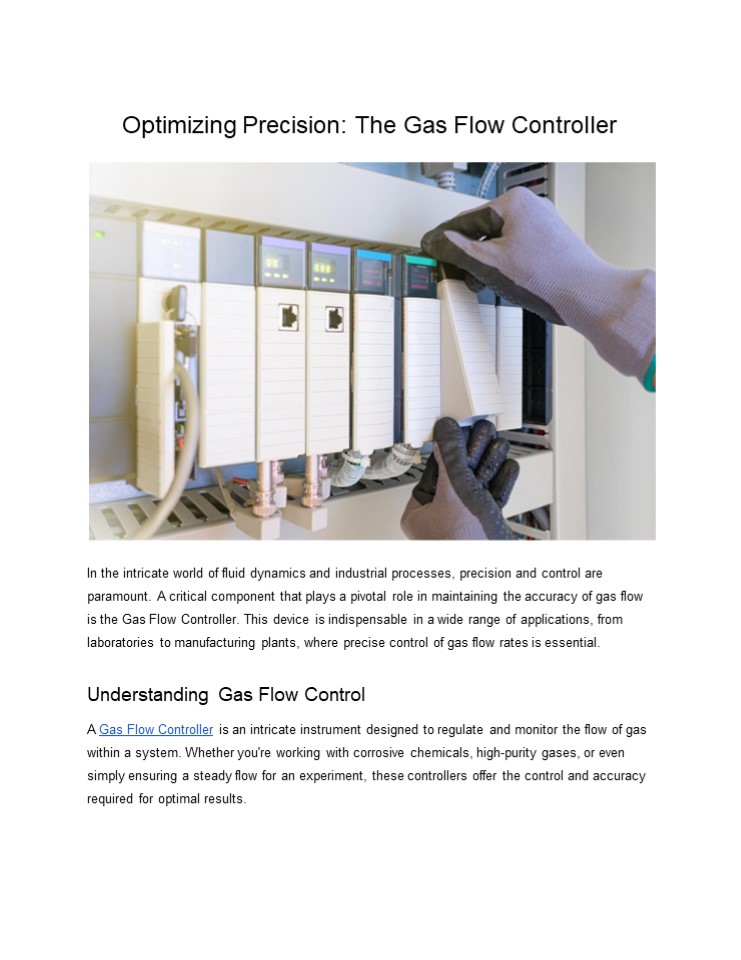Optimizing Precision: The Gas Flow Controller - PowerPoint PPT Presentation
Title:
Optimizing Precision: The Gas Flow Controller
Description:
Discover the significance of Gas Flow Controllers in achieving precision and control in various industries. Explore their applications, key features, and future innovations in our comprehensive blog. – PowerPoint PPT presentation
Number of Views:3
Title: Optimizing Precision: The Gas Flow Controller
1
Optimizing Precision The Gas Flow Controller
In the intricate world of fluid dynamics and
industrial processes, precision and control are
paramount. A critical component that plays a
pivotal role in maintaining the accuracy of gas
flow is the Gas Flow Controller. This device is
indispensable in a wide range of applications,
from laboratories to manufacturing plants, where
precise control of gas flow rates is
essential. Understanding Gas Flow Control A Gas
Flow Controller is an intricate instrument
designed to regulate and monitor the flow of gas
within a system. Whether you're working with
corrosive chemicals, high-purity gases, or even
simply ensuring a steady flow for an experiment,
these controllers offer the control and accuracy
required for optimal results.
2
The Science Behind It At the heart of a Gas Flow
Controller lies the principle of mass flow
control, which measures the flow rate based on
the mass of the gas. This approach offers several
advantages over traditional volume-based
control. It remains unaffected by changes in
temperature and pressure, making it highly
accurate and dependable. This technology can be
implemented using various sensor types, such as
thermal mass flow sensors, capillary tubes, or
laminar flow elements, each with its own unique
set of advantages. Applications of Gas Flow
Controllers Laboratory Experiments In research
and development, precision is essential. Gas Flow
Controllers help researchers ensure the right
amount of gas is delivered, maintaining the
integrity of their experiments and
results. Manufacturing In industries like
semiconductor manufacturing, pharmaceuticals, and
food processing, precise gas flow is necessary to
control chemical reactions, maintain sterility,
or aid in product quality control. Environmental
Monitoring Gas Flow Controllers are used in
environmental monitoring systems to precisely
measure and regulate the flow of calibration
gases for various analytical instruments,
ensuring accurate measurements of pollutants and
emissions. Healthcare In medical devices and
equipment like ventilators and anesthesia
machines, Gas Flow Controllers help maintain a
consistent and precise flow of medical gases for
patient safety and comfort. Key Features of Gas
Flow Controllers Accuracy These controllers are
engineered to provide unparalleled accuracy in
regulating gas flow, ensuring that the desired
rate is maintained consistently. Stability They
offer exceptional stability over time, reducing
fluctuations that can impact the quality of
research or production processes.
3
Customization Gas Flow Controllers can be
customized to suit specific needs, with options
for different gases, flow rates, and control
interfaces. Remote Control Many modern
controllers can be operated remotely, which is
especially useful in hazardous or hard-to-reach
environments. Data Logging Some controllers
offer data logging capabilities, enabling users
to record and analyze gas flow data for quality
control and troubleshooting. User-Friendly
Interface Intuitive interfaces and displays make
these devices accessible to a wide range of
users, from seasoned professionals to
newcomers. Challenges and Considerations While
Gas Flow Controllers offer numerous benefits,
there are certain challenges that users must
consider. These include the need for periodic
calibration, compatibility with specific gases,
and the potential for sensor drift over time.
It's crucial to choose a Gas Flow Controller that
aligns with the specific requirements of your
application and ensures proper maintenance to
sustain optimal performance. The Future of Gas
Flow Control As technology advances, Gas Flow
Controllers continue to evolve. The incorporation
of digital control systems, smart sensors, and
data analytics is driving further improvements in
precision, reliability, and user-friendliness.
These innovations promise to enhance the
performance of Gas Flow Controllers, expanding
their application in emerging fields and
industries. The Gas Flow Controller is an
indispensable tool for ensuring precision and
control in gas flow across a diverse range of
applications. Its role in research,
manufacturing, environmental monitoring, and
healthcare is crucial for achieving consistent
and accurate results. As technology continues to
advance, these controllers will play an
increasingly pivotal role in supporting
innovation and quality control, making them a key
component in various industries.































